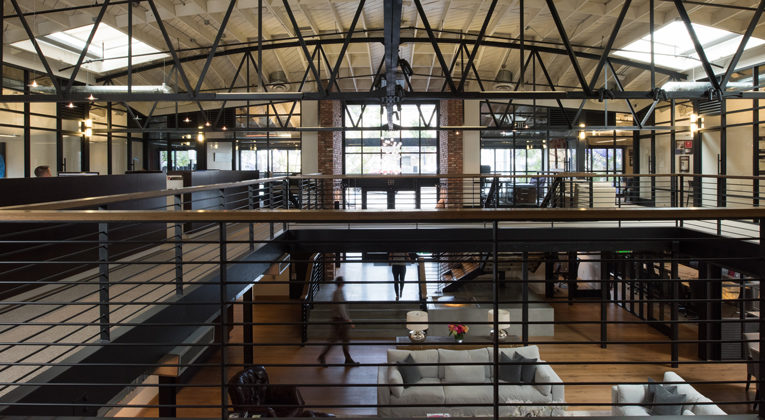By Jason Hughes
What was once the unthinkable is now our reality. Outside of Bill Gates and maybe a handful of epidemiologists from around the world, I’m not sure anyone could have dreamt of a global social and economic lockdown to head off a global pandemic. So here we are, nearly three months of home quarantine later, realizing that most of us can actually work from home quite well…when forced to.
So, our experience begs the question, do we need office space anymore?
Before I share my guestimate, I think it’s important to consider history. Remember Yahoo? Back in 2013, Marissa Mayer got top billing in Forbes for her “decree” that there would be no more working from home for Yahoo staff. While she had lots of backlash at the time, a year later a Gallup State of the American Workplace report found that people who work remotely are more engaged, enthusiastic and committed to their work–but only if they work outside the office 20% of the time or less. Mayer argued at the time that communication and collaboration with teammates, face-to-face, was a prerequisite for top corporate performance. The CEO of Gallup said studies showed that people who spend 50% or more of their time working off site are less engaged than in-office counterparts and people who spend all of their time remotely are twice as likely to feel disconnected from their work. In 2014, The Washington Post reported an explosive story about how the U.S. Patent Office found that a large number of that department’s at-home workers routinely lied about the amount of hours they put in and that oversight of the “telework” program was completely ineffective.
Then there was IBM, arguably one of the pioneers of the work from home (WFH) initiative–having had remote workers from as far back as the 1980’s. In 2009, it was reported that 40% of IBM’s 360,000 global employees worked from home–saving IBM about $100 million in rent annually. But in 2017, IBM recalled all of their remote workers. And those who didn’t live near IBM offices? They either had to make the daily commute, relocate–or resign. IBM believed that strong culture and winning ideas came from collaboration, and not isolation. They referenced studies that had shown physical proximity as creating more effective communication, better understanding between coworkers and more collaboration.
Just days ago, Microsoft CEO Satya Nadella, in an interview with The New York Times, warned that permanent remote work could lead to negative consequences for social interaction and mental health. He went on to say that switching to entirely remote offices would just be “replacing one dogma with another dogma.”
But for every study showing the detriments of the WFH life, there are studies showing the exact opposite. A management professor from UCLA said that a variety of studies show that telecommuting and working from home are associated with higher productivity. With all the conflicting positions, who is right?
When reflecting on today’s environment, most business leaders have been surprised at how well their team has adapted to the WFH life as a result of government-forced shelter in place orders. Most employees have seen their fellow peers laid off, so they’re highly motivated to prove their indispensable value to the company, and everyone is working hard to keep their seat at the table. But how will employees behave when working at home is not the law? And how will working at home turn out with kids still at home with summer camp and school cancelled, summer vacations wiped out, dogs barking in the background, and doing Zoom calls in the bedroom, car or at the dining room table?
Ultimately when others are back at work, in close proximity to their bosses or partners/owners of the business, lunching and laughing in the office, and going to happy hour or dinner after work, how will those working at home fair? There are self-motivated people who will be focused and work hard whether they’re in a 5’x5’ box or with a laptop at Disneyland…but most mortals won’t over time. Already, employers and insurance companies are talking about a future flood of workers’ comp claims as most employees don’t have proper seating, keyboards, work surface and ergonomics at home, not to mention that most employees don’t have an actual “home office,” and high speed Internet is not a universal given at home in some communities.
So, when will the bloom come off the rose? This brings me to my answer about the need for office space. Yes, most companies need it, but not all, and some who need it will choose to have less than before. However, if you are a biotech research company, hardware or semiconductor technology company, manufacturing or distribution company, or medical office use, chances are that the office houses critical infrastructure and operating systems that require your business to have commercial space.
But my most important advice in these times is to be patient and to give time a little more time. We’ve had decades of working in offices, and not even three months of working from home (in a forced environment no less). Tomorrow may bring therapeutics and vaccines which would neutralize all of our fears. But in the meantime, understand your alternatives and let rental rates and market concessions work to your advantage. Although not always possible given the nature of expiring leases, it’s best to not be first at the negotiations table in a declining market or to make rushed or rash decisions. Information and clarity will be slow to present itself, and those who rush into solutions are more prone to make mistakes and leave money on the table. As the commercial markets collapse nationally as landlords fight for fewer and smaller tenants, and sublease inventory simultaneously floods the market, if you do need or want office space, you’ll be indexing at a much lower basis with flexible terms, creating more cost savings and optionality for your business.
Jason Hughes is founder of Hughes Marino, an award-winning commercial real estate company with offices across the nation. A pioneer in the field of tenant representation, Jason has exclusively represented tenants and buyers for more than 30 years. Contact Jason at 1-844-662-6635 or jason@hughesmarino.com to learn more.











